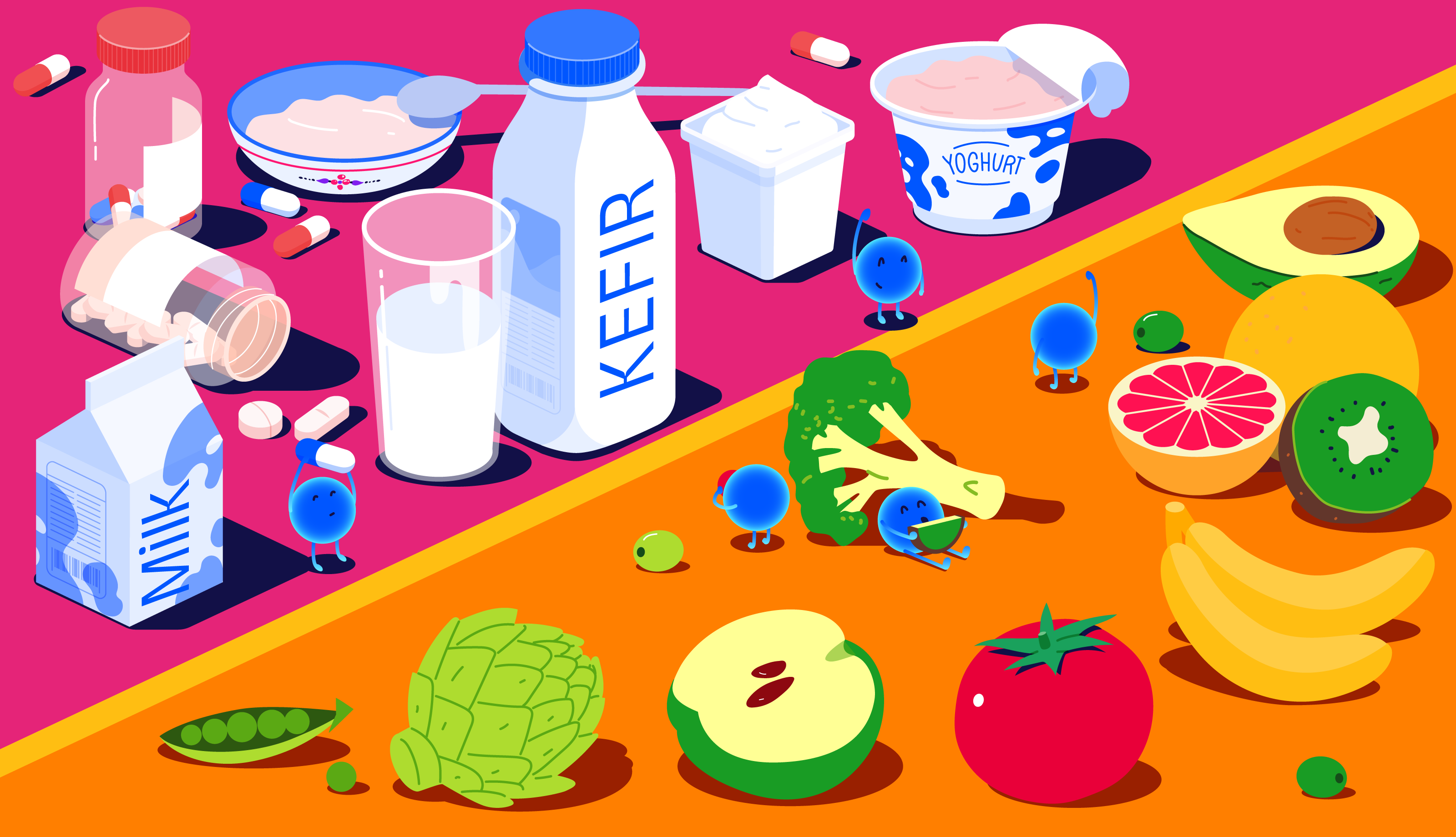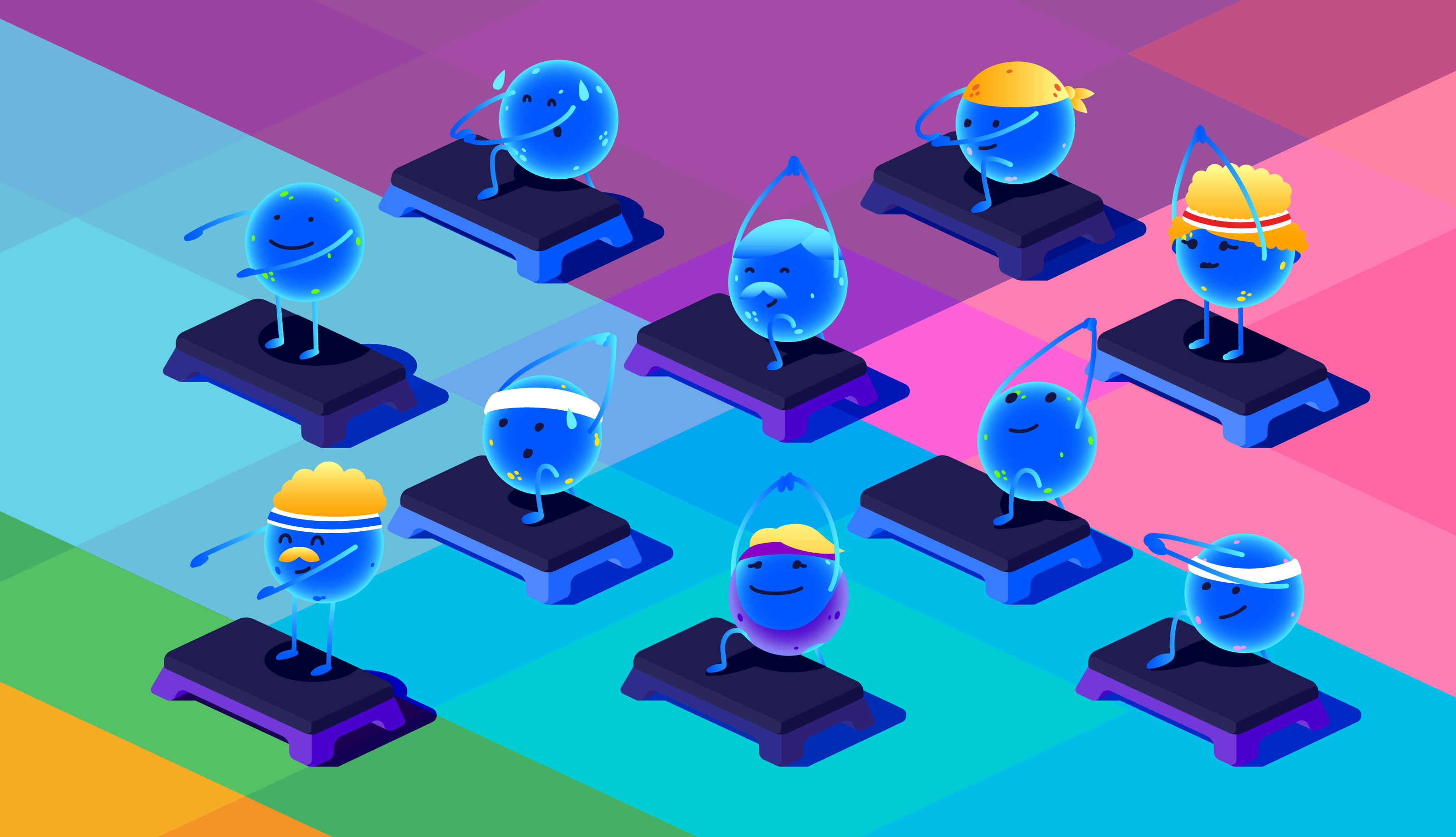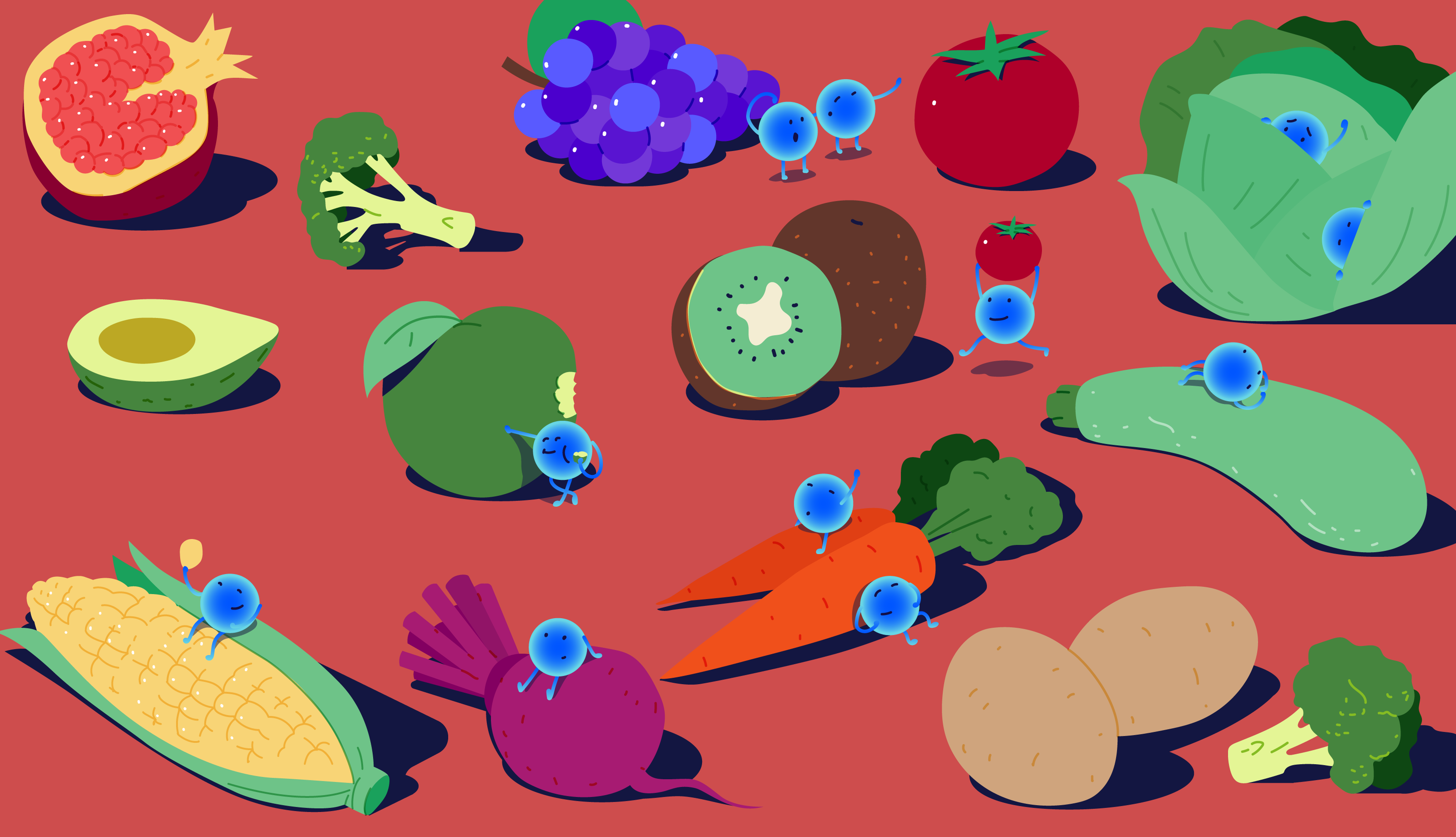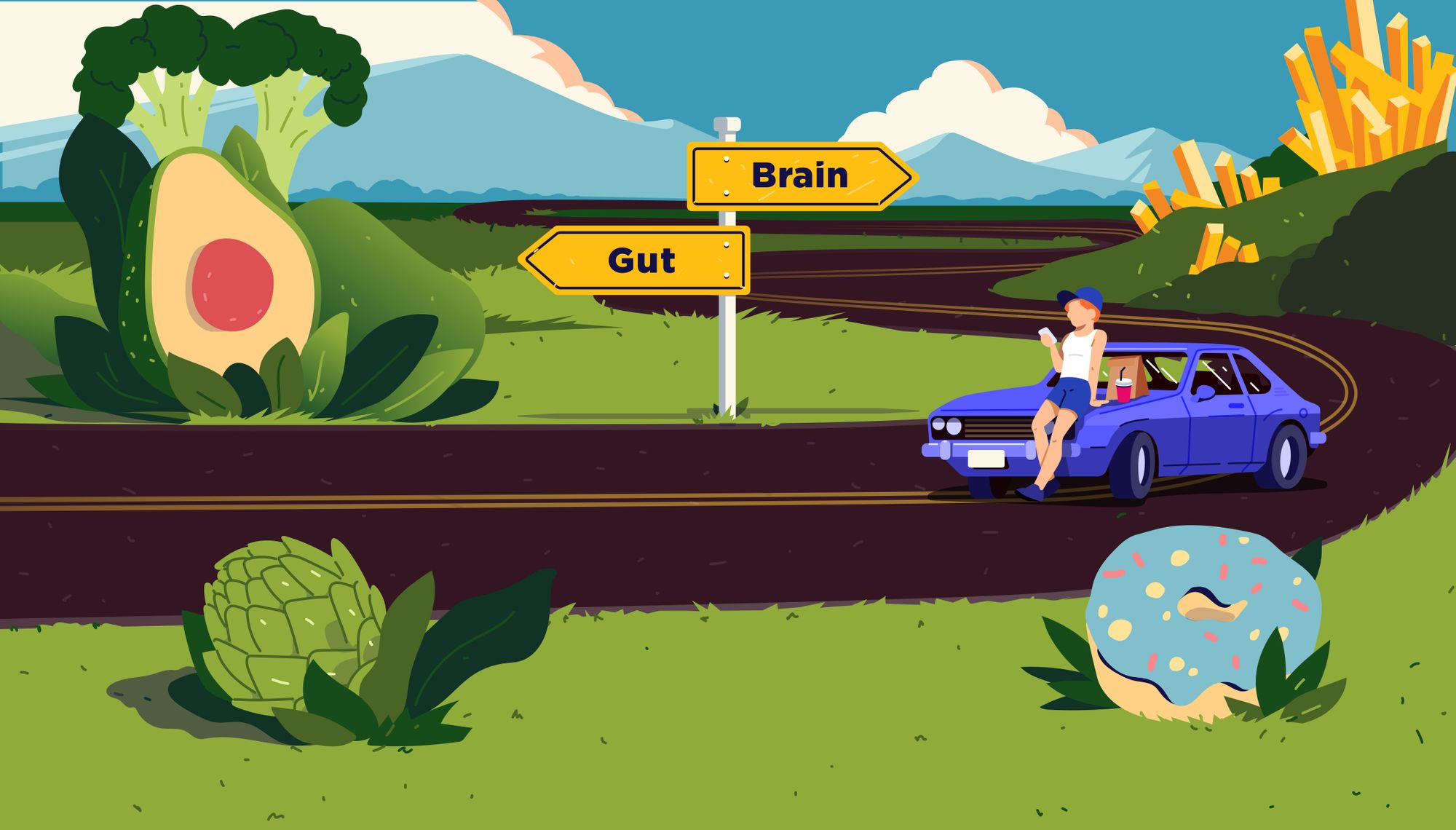This guide explains the difference between pre and probiotics, what they are, why they’re important for your health, and what foods to find them in.
Prebiotics are foods that promote the growth of beneficial gut bacteria, but probiotics are edible sources that actually contain health-promoting microbes. Here we explain their functions, benefits, what foods they’re in, and whether prebiotics and probiotics supplements are useful.
Table of contents
- Prebiotic versus probiotic functions (infographic)
- What does a prebiotic do?
- What are probiotics and probiotic bacteria?
- Prebiotic foods list
- Can you take prebiotics and probiotics together?
Prebiotic versus probiotic: what’s the difference?
Pre and probiotics are beneficial for human health because gut bacteria play a key role in many aspects of the body, not just the colon.
The gut microbiota consists of trillions of bacterial cells which carry out a variety of important functions in the human body. It’s not possible to live without your microbiota, and the benefits of a diverse and balanced microbiome extend well beyond the gut. Here are just a few important jobs gut microbes do:
- Promote protection against metabolic diseases
- Help maintain a healthy body weight
- Produce important short-chain fatty acids
- Train the immune system to work optimally
- Deter pathogens that could make you sick
- Maintain the intestinal lining against “leaky gut”
Your colonic bacteria trade their health-promoting functions for a place to live (in your large intestine). In fact, they do so well for you that you barely even know they’re there. It is possible to increase the diversity of your gut microbiota (which only benefits your health). That’s where prebiotics and probiotics come in.
What are prebiotics?
Prebiotics are substances found mostly in plant-based foods which provide sustenance for the beneficial bacteria in your gut. Prebiotic dietary fibers, resistant starches, and polyphenols (a type of phytonutrient) promote the growth and activity of health-promoting microbes.
The body isn’t able to break down these substances, so it passes them on to the microbiota where your gut microbes turn them into useful metabolites like short-chain fatty acids (SCFAs) and vitamins.
What are probiotics?
Probiotics are foods and supplements which contain a source of live bacteria that can have several actions on the human body. Probiotic bacteria, like Lactobacillus and Bifidobacterium, help maintain order in the gut microbiome by maintaining the right acidity and deterring opportunistic from colonising your gut.
Prebiotics and probiotics go together well because probiotic and beneficial bacteria cannot thrive without prebiotics because prebiotics are an important source of sustenance. As a result, the reduced abundance of health-promoting bacteria could cause imbalances in your gut ecosystem that is felt throughout the body.
☝TIP☝You can buy prebiotic and probiotics supplements, but it’s best to try and incorporate prebiotic and probiotic foods into your diet.
Prebiotics benefits: what do prebiotics do?
Prebiotics nourish your gut microbiome, boost the growth of beneficial bacteria, and promote the production of health-promoting substances.
You probably already consume prebiotics without even realising it because they naturally occur in plant foods, and milk too. The most stable sources of prebiotics are specific types of dietary fibre because they are less sensitive to heat and age, compared to say, polyphenols, which are plant nutrients that can be affected by cooking.
However, just because many fibers are prebiotics doesn’t mean that all fibre is prebiotic. Some insoluble fibers can’t be broken down by gut microbes. That’s okay because they give mass and bulk to your stools, like psyllium husk and hemicellulose. They help you to have regular bowel movements, thus preventing constipation and abdominal discomfort.
When to take prebiotics?
Most people in Europe don’t hit the daily recommended allowance of fiber, which means that people are simply not getting enough plant-based foods. By doing so, they are also depriving their gut microbiomes of sustenance from prebiotics.

Increasing your prebiotic intake is really simple: eat prebiotic foods. This is particularly important for individuals who do not currently consume enough fibre in their diet, like those who eat lots of fat, processed meat, and refined sugars, as well as people who follow fad or restrictive diets.
How to take prebiotics?
Aim to get 30g of fiber per day from plant foods, including prebiotics, to support your gut health and microbiome balance. If you want to increase the stakes, try to eat the rainbow and get 30 plant foods of different colours into your diet per week.
Considering prebiotic supplements? Remember that they don’t come with all these added benefits. They are not a silver bullet, no matter what the packet says, because a diverse and balanced diet has been shown time and time again to be effective at promoting general health, healthy body weight, and preventing disease.
☝TIP☝You can find out the best prebiotics for you and get personalised food recommendations by taking an Atlas Microbiome Test.
Probiotics: what do probiotics do?:
Probiotics in fermented foods and supplements may benefit health by breaking down food and boosting the immune system.
Fermentation is a process where bacteria transform a substance, and it’s what probiotic bacteria are renowned for. Probiotics can have positive health effects even if they just pass through the gastrointestinal tract but don’t settle down in the microbiome.

Are there plant based probiotics? Definitely, foods like tempeh (fermented soy), sauerkraut, kimchi, and lacto-fermented pickles are only possible thanks to the actions of bacteria like Lactobacillus and Bifidobacterium that metabolise sugars and increase the nutritional value of these foods.
Fermentation is advantageous for humans because such foods provide a great way for the beneficial bacteria to enter the body. Historically, it was also essential because no one had a fridge or freezer back in the day, and now science is turning to these traditional foods to find solutions for health.
☝FACT☝Probiotics are examples of beneficial bacteria which enter our body, usually through the ingestion of fermented foods, that have positive benefits for our health.
Health benefits of probiotics
Lots of research has been carried out about the benefits of probiotics on human health, and not just for gastrointestinal disturbances. In fact, the effects of probiotics are so vast that researchers are even studying how they contribute to mental health.
If your doctor has ever prescribed probiotics alongside a course of antibiotics, it’s because antibiotics disrupt the microbiome and probiotics can help mitigate the negative effects. Probiotics introduce beneficial bacteria into the gut microbiome that can help restore balance and prevent unhelpful, opportunistic bacteria from becoming too abundant.

Some research suggests that probiotics could have anti-cancer properties, especially against colon cancer. Studies have shown that certain strains of Lactobacillus and Bifidobacteria can stop the growth of bacteria which produce enzymes that convert pro-carcinogens to carcinogens.
Interestingly, a new field of research is looking at the effects of gut bacteria on the brain - it’s called psychobiotics. There’s some evidence that some metabolites produced by probiotic microbes can influence brain health, stress resilience, and even depression symptoms.
Probiotics: are there side effects?
Probiotics have been demonstrated time and time again to be safe for use in healthy people. However, those who are immunocompromised, people whose immune system is already impaired, may experience side effects from probiotic administration. The side effects may include:
- Gas
- Constipation
- Nausea
- Hiccups
- Rash
- Infections
Other groups who could be at risk of adverse reactions to probiotics are pregnant women, those with structural heart disease, or those who have a serious digestive condition allowing bacteria to cross the intestinal barrier and into the bloodstream.
Probiotic and prebiotic foods list
Now that you know how prebiotics promote gut microbiome health and why probiotics can support overall wellbeing, here are some examples of prebiotics and probiotics.
Prebiotics food list
| Apples | Citrus | Mushrooms |
| Barley | Cold potato/pasta | Oats |
| Beetroot | Cranberries | Onions |
| Berries | Garlic | Rye |
| Blackberries | Jerusalem artichoke | Wheat |
| Chicory | Legumes |
Probiotics foods list
There is an array of foods which are considered probiotic, especially fermented types, and there are plant-based foods too. Some examples are:
| Dairy | Beverages | Pickles | Soy |
|---|---|---|---|
| Yoghurt | Water kefir | Sauerkraut | Miso |
| Milk kefir | Kombucha | Kimchi | Tempeh |
| Soft, raw cheeses | Tepache | Lacto-fermented pickles | Natto |
Can you take prebiotics and probiotics together?
Prebiotic probiotic – they might be two different products, but the two combined produces synbiotics.
Synbiotics are a combined prebiotic probiotic supplement that contains a probiotic bacteria strain and a prebiotic fibres which work together to promote gut health. They do so by improving the survival of supplements containing live microbes.

However, finding the best prebiotic and probiotic combination may be more difficult than first thought. That’s because everyone’s microbiome is unique, so there’s no best prebiotic and probiotic specifically for you - at least not without taking a microbiome test and consulting a nutritionist to find the right combination.
Just remember this
Prebiotics and probiotics are vital for the health of not only your gut, but your body in general. Prebiotics are types of fibre which provide nourishment to your health-promoting gut bacteria, whereas probiotics are live beneficial bacteria which have health benefits for humans.
Consuming more of each couldn’t be easier. Our prebiotic and probiotic foods list should give you a little inspiration for what you could incorporate into your diet to boost your gut health.
Without prebiotics, probiotics can’t thrive because eating probiotic foods along with prebiotic fibres helps ensure the safe delivery of healthy bacteria to your gut, and will also give them a food source to convert to beneficial organic compounds.
There is no best prebiotic and probiotic supplement, it depends on the composition of your microbiome. Rather, the best prebiotics and probiotics are found in your meals.
- Akkasheh, G et al. Clinical and Metabolic Response to Probiotic Administration in Patients with Major Depressive Disorder: A Randomized, Double-Blind, Placebo-Controlled Trial, 2016
- Baxter, N, T et al. Dynamics of Human Gut Microbiota and Short-Chain Fatty Acids in Response to Dietary Interventions with Three Fermentable Fibers, 2019
- Dhingra, D et al. Dietary Fibre in Foods: A Review, 2012
- Ellerbroek, A. The Effect of Ketogenic Diets on the Gut Microbiota, 2018
- Glibowski, P and Skrzypczak, K. Prebiotic and Synbiotic Foods, 2017
- Islam, S, U. Clinical Uses of Probiotics, 2016
- Kechagia, M. Health Benefits of Probiotics: A Review, 2013
- Khalesi, S et al. Effect of Probiotics on Blood Pressure: A Systematic Review and Meta-Analysis of Randomized, Controlled Trials, 2014
- O’Bryan, C, A et al. The Role of Prebiotics and Probiotics in Human Health, 2013
- Rao, S, S C et al. Brain Fogginess, Gas and Bloating: A Link Between SIBO, Probiotics and Metabolic Acidosis, 2018
- Yari, Z and Hekmatdoost, A. Dietary Interventions in Fatty Liver, 2019



















